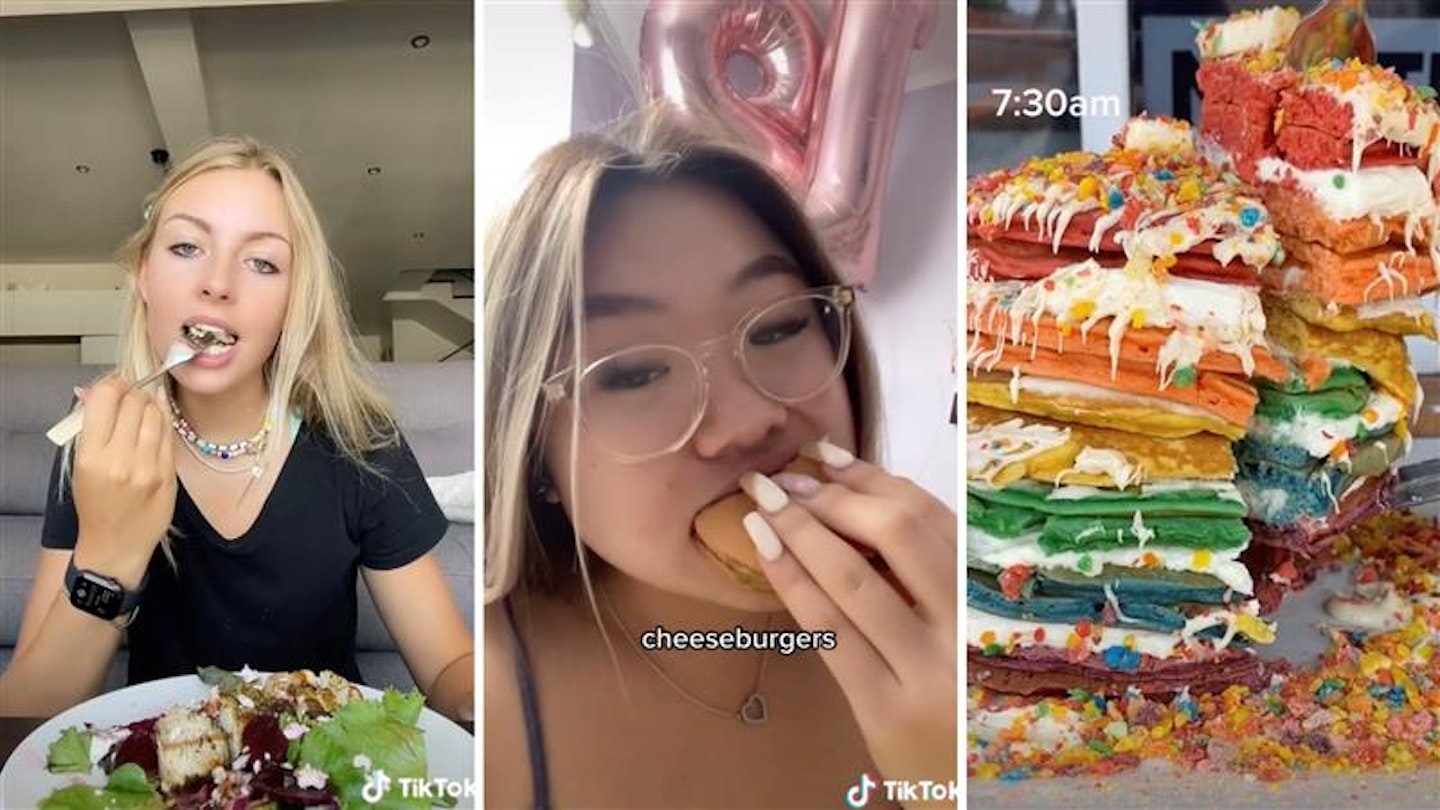What I eat in a day is possibly the most uninteresting thing about me. Yet on TikTok, the #WhatIEatInADay trend, which shows footage of TikToker's revealing everything they eat in 24hrs, has accumulated over 10.3 billion views. Yep, you read that right.
9am coffee, 11am avo on toast, 2pm protein bar, 6pm ratatouille. Next. 11am smoothie. 2pm strawberries. 5pm carrot sticks and hummus. 7pm burrito. Keep scrolling. Before you know it, hours have passed and you’ve watched thousands of food diaries from ‘recovering binge eaters’, calorie counters and those avoiding certain food groups. It’s not healthy, it’s damaging. And something needs to change.
‘By detailing exactly how much a person is eating in a day, these videos often promote weight loss and can demonstrate eating disorder behaviours,’ says Tom Quinn, director of external affairs at Beat, the UK's leading eating disorder charity.
So, why are we so obsessed with what other people eat? Some say they find these video food diaries inspiring, helpful even, to get a sneak peek into someone else’s eating habits – especially if it’s someone they admire.
Ella Wells, 25, from Cambridge, says she started watching them on YouTube after YouTuber Gabriella Lindley started posting them in 2018. ‘I liked seeing supermarket hauls and seeing what people had bought on their food shop. Katie Snooks, a vlogger with over 85k followers on Instagram, used to do a feature of this in her vlogs and I found it so interesting. I’m not a big foodie, I just loved watching them and found them therapeutic. Recently, I’ve enjoyed seeing reels on TikTok because I’ve been suffering from bloating and suspected IBS, so I’ve been getting inspiration on the kinds of foods I could eat to help with that. Katie Snooks also did a few of the videos when she was doing the FODMAP diet, which I have recently revisited as I’m considering giving it a go.’
While Gabby Abbott, 29, from London, admits her fascination with the trend stemmed from an eating disorder. ‘I started watching them when I was struggling with food. I had an eating disorder and my obsession around that was definitely one reason,’ she says. ‘A lot of the people I followed online also started to post these videos and naturally I was interested in their lives. Now, fully recovered and someone who loves training and eating well, I tend to use them for inspiration more than anything and to get tips.’
But getting fixated on the specifics of someone else’s eating habits can be problematic and set the viewer up for unrealistic expectations, according to some experts.
‘I have real issues with these videos,’ says Renee McGregor, dietitian and eating disorder specialist. ‘All our food requirements are different because our physical activity, our genetics, and our backgrounds are different – are you recovering from an eating disorder? Are you training for a marathon?
‘I never share what I eat in a day online. Occasionally I might share a picture of a piece of cake because I'm out with friends, but I would never share my daily meals because you're suggesting that's what everybody else should be doing. Everybody is different with individual body needs. Assumptions are made on visuals, on what that person looks like. It plays into the thought process of: “If I eat like them, I'll look like them. I'll be as happy as them, I'll be as glowy as them, my life will be perfect”. But of course, that's not true, and can lead to feelings of failure and low self worth,’ says Renee.
Kylie Jenner has jumped on the trend – her #WhatIEatInADay video has a cool 15.8 million likes, and shows a bowl of yoghurt topped with crunchy granola, blueberries, raspberries and a sprig of mint, paired with a frothy matcha latte.
So, should you avoid them altogether? At the top of the hashtag homepage, there’s a message from TikTok that says: “If you or someone you know are experiencing concerns around body image, food, or exercise – it's important that you know help is out there and that you are not alone. If helpful, you can confide in someone you trust.” They also include the contact details for Beat.
‘If you watch these videos, you have to ask yourself why,’ says Renee. ‘Is it really serving you? And do you feel worse after viewing them?’
Eating disorder psychologist, Dr Rachel Evans, also suggests letting TikTok know you’re not interested in that content by hiding it and actively engaging with other posts. She agrees that if these videos start making you feel guilty and anxious, then they could be doing more harm than good.
‘These videos can lead to disordered eating when the viewer creates external food rules based on the content they are watching and becomes out of touch with their own hunger and fullness signals,’ she says. ‘There’s nothing wrong with taking inspiration from food videos, however, it’s important to take a step back and see how a certain way of eating is making you feel. A red flag is if you start to feel guilty and anxious about eating anything not shown in the videos or you begin binge eating ‘forbidden’ foods.’
If you're worried about an eating disorder, speak to your GP or contact Beat, the UK’s eating disorder charity****, on 0808 801 0677 or beateatingdisorders.org.uk
